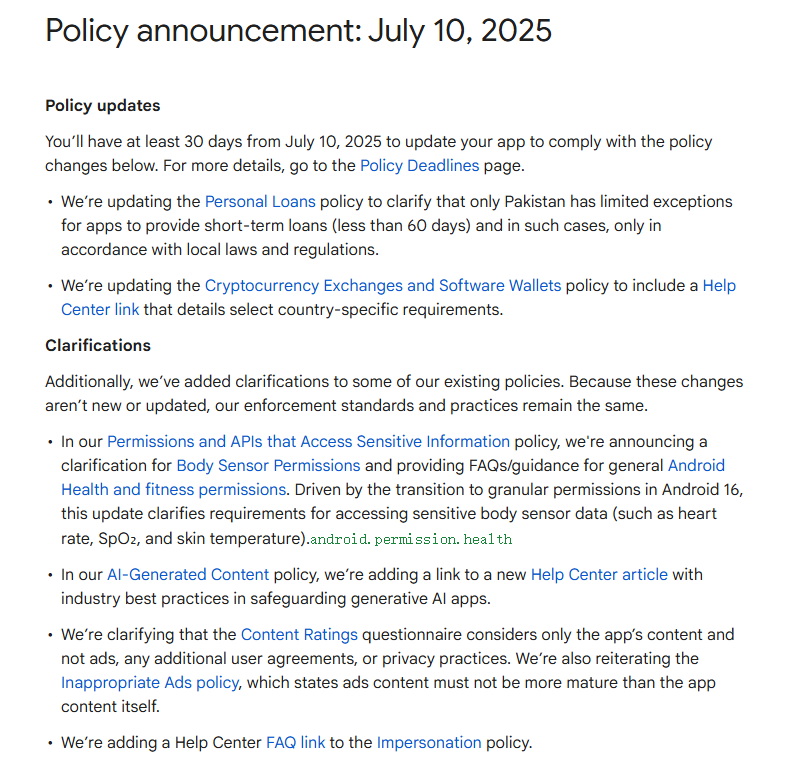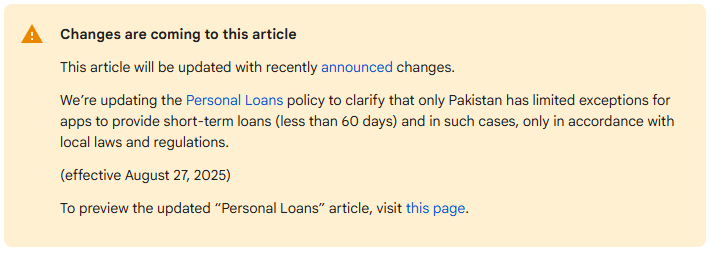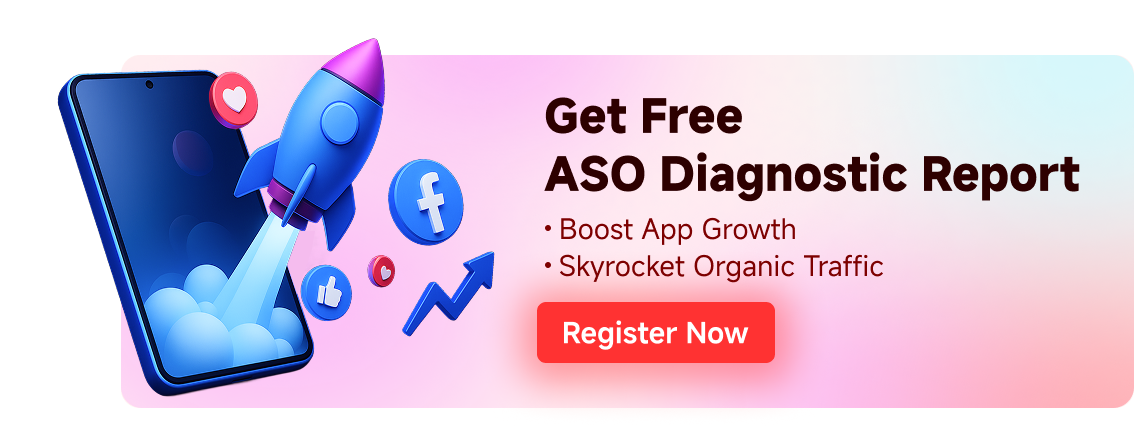Free consultation with ASO specialists
Doing ASO for the first time or have no idea how to carry out targeted optimization of your app?
We offer one-on-one customized services provided by app marketing specialists
Google Play Policy Update in July 2025: A Must-Read Guide and Checklist of Key Actions for Developers
2025-07-23
On July 10, Beijing time, Google officially released the announcement of the policy update for the second half of 2025 for Play Store, involving major adjustments in multiple fields such as fintech, data privacy, and AI content management. This update not only imposes stricter regional compliance requirements on specific categories of applications, but also sets new standards for health data access and content ratings.
As a developer, you need to make critical adjustments in the next 90 days. This article translates policy priorities into clear action guidelines to help you efficiently respond to changes.

Important Policy Review: Comprehensive Tightening of Financial App Regulation
-
Personal Loan Application: Pakistan becomes the only exception market
According to the latest revised personal loan policy, Google Play will tighten the listing standards for short-term loan applications worldwide, and only one exception area will be retained:
-
Only allowed in Pakistan region Offering ultra-short-term loan services of no more than 60 days
-
The application must fully comply with local Pakistani loan regulations and disclosure requirements
-
Effective date: August 27, 2025 Non-compliant apps will be removed if they fail to comply with the rules

This policy means that short-term loan applications operating in other regions need to adjust their business models or stop services immediately.
-
Cryptocurrency Wallets and Exchanges: Country Compliance Transparency Upgrade
The policy update for cryptocurrency apps focuses on clarifying regional compliance requirements:
-
Google Play adds a link to the official help center in its policy terms, which lists compliance details for different countries and regions
-
Developers must complete as per the target market regulations Legal procedures such as license filing, user risk disclosure, etc.
-
The execution window period is until October 29, 2025. After that, applications that fail to meet the standards will be restricted to operate in the corresponding areas
This adjustment reflects the increasingly strict control of digital currency services by global regulators, and developers need to check their local compliance qualifications as soon as possible.
As of now, the countries/regions involved in information disclosure include: the United States, the United Kingdom, the European Union, Hong Kong, Japan, South Korea, Canada, the United Arab Emirates, Indonesia, the Philippines, Thailand, South Africa, Bahrain, Switzerland, etc.

Platform risk prevention and control upgraded again: four high-risk areas need self-inspection
-
New Standard of Health Permissions: Android 16 Reconstructs Permission System
With the introduction of Body Sensor API permission classification mechanism in Android 16 (expected to be released in the second half of the year), the rules for applications to access health data have fundamentally changed:
-
Heart rate, blood oxygen (SpO₂) and other sensitive data Independent authorization process will be enabled
-
Existing apps need to refactor the permission request logic to avoid relying on a broad health data permission group
-
Users can turn on/off the permissions of various health data items one by one, and developers need to adapt to the "some permissions disabled" scenario
Developers need to complete the permission adaptation before November 1, 2025. Otherwise, new applications will not be able to go online, and existing applications may be restricted from updating.
-
AI Generated Content: Mandatory security protection mechanism
According to Google Play AI Content Policy , the application needs:
-
Prohibition of generation Deepfakes, self-harm encouragement, election misinformation and other content;
-
Built-in real-time reporting function allows users to directly mark the content that violates the rules;
-
Trace the source of AI model training data to ensure that it does not contain infringing or sensitive information.
Case in point: An AI chat app was taken down for generating fake medical advice, and developers should take this as a warning.
-
Advertising content ratings: Prohibition of cross-level dumping
The ratings of the advertisement content (including videos, images and texts, and jump links) shall not be higher than those of the application itself.
-
Apps with a "Everyone" rating may not show ads that contain violence or adult content;
-
If a game app contains in-app purchases, it must be clearly marked as "contains paid content" on the store page.
-
Violating ads will be restricted from being displayed, and serious violators may trigger the removal of their apps.
-
Fake App Detection: New Anti-Spoofing Guidelines
For the behavior of counterfeit applications, icon plagiarism, function plagiarism, etc.:
-
The Policy Center has added an Anti-Impersonation FAQ document, which clearly defines the criteria for determining impersonation packages
-
Developers can initiate a delisting request through the fast reporting channel if they encounter infringement
-
Brand trademark holders can apply Official Brand Protection Badge
Google Play recently updated the "Counterfeit Policy FAQ", which focuses on:
-
Fake apps : including applications that imitate the interfaces of well-known brands and steal others' codes;
-
Developer Identity Misuse : Registering with false company information or other people's qualifications;
-
Appeal Path : Developers who are misjudged can Fake complaint page Submit evidence, and the review period will be shortened to 5 working days.
Key Deadline: Missing the Time is Equal to Giving Up the Market
-
News and magazine apps: Statement submission deadline
-
Before August 27, 2025 You need to submit a content authenticity statement in Play Console
-
Need to promise No spreading of fake news, no manipulation of click-inducing behavior
-
Android 15 target API mandatory upgrade
-
New Apps and App Updates : Must Target Android 15 (API 35)
-
Current Applications : Need at least target Android 14 (API 34), otherwise it cannot be installed on new devices
-
Extension Options : Apply for extension through Play Console to November 1st
Technical Tips : Using the SDK Upgrade Assistant built into Android Studio can automate 60% of the adaptation work, significantly reducing labor hours.
Account security reinforcement: Two-factor authentication is now mandatory
Since May 12, 2025, Google Play has fully implemented two-step verification (2SV) for developer accounts:
-
High-risk operation mandatory verification : Application submission, financial withdrawal, member permission change
-
Recommend enterprise-level solutions : Security Key first, disable SMS verification code
-
Automated Process Adaptation : Configure "Application-specific Password" for CI/CD Pipeline
Teams that have not completed the configuration need to log in to the Google account security page and enable it immediately, otherwise they will lose the application management authority.
Policy Trend Interpretation: Compliance Transparency and Risk Refinement
This policy upgrade sends out three clear signals:
-
Fintech High Risk Control : Limit sensitive business through geo-fencing to avoid regulatory arbitrage
-
Data Sovereignty Awareness Strengthened : Health, biometric data and other data enabled Item-by-item authorization mechanism
-
Safety Prepositioning : From post-listing supervision to access control in the development stage
The Google Play policy team bluntly stated in the update notes that "99% of malicious applications can be intercepted through basic compliance review every year", which indirectly confirms the technical rationality of tightening policies.
Summary: Coping Strategies under Tightening Policies
-
Financial App: Focus on Compliance Market and Transparent Operation
-
Short-term loan apps can consider transforming to the Pakistani market, and optimize the repayment reminder function at the same time to avoid overdue payments by users;
-
Cryptocurrency apps need to work with local compliance service providers to ensure that the help center content complies with the legal requirements of each country.
-
Technical risk prevention and control: Establish an automated detection mechanism
-
For Android 16 permission changes, use Android SDK Upgrade Assistant Test the logic of permission calls in advance;
-
Deploy AI content filtering tools (such as Google Cloud Content Safety API) to block generated content in real time.
-
Long-term compliance construction: metadata and user experience are equally important
-
Regularly use the AppFast free metadata diagnostic tool to check if there are any keywords that violate regulations in the app title, description, and screenshots;
-
Optimize advertising strategies to ensure that the content of advertisements is highly matched with the core functions of the application, and improve user retention.
Only 40 days left before the nearest deadline (August 27) , see the original policy for details: Google Play Policy Updates Center
AppFast helps to upgrade compliance
In the face of a complex policy environment, developers can use AppFast's professional metadata diagnostic tool to quickly identify potential risks on the store page (such as non-compliant keywords and mismatched ratings) and generate optimization suggestions. Click Instant Diagnosis , one-click to improve application compliance and exposure, and calmly deal with the challenges of Google Play policies.
Only by adhering to the compliance bottom line can we win the space for innovation.

